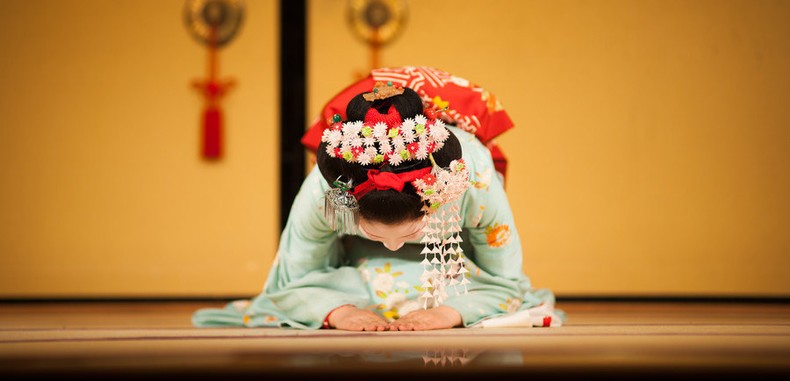We know that in the Japanese language there are several ways to say thank you like arigatou. But have you thought about how to respond to a thank you in Japanese? In this article, we'll see different ways to say "you're welcome" in the Japanese language.
When hearing a “arigatou” [ありがとう], the most common, polite, and formal response is to say “douitashimashite” [どう致しまして], which is the closest equivalent to Portuguese “de nada”. What are the other ways to respond to a thank you in Japanese?
Remember! Never learn Japanese by studying isolated words. If you are confused about the correct order or method to study the Japanese language, we recommend reading our: Study Guide for Learning Japanese.
Table of Content
Word Origin for Douitashimashite
The word douitashimashite literally means "I really didn't do anything anyway, so don't mind." The origin of the word douitashimashite can be explained as follows:
- dou [どう] comes from the expression owneryouni [どの様に] meaning anyway;
- Itashimashite [致しまして] comes from the verb itu [致す] which is the polite and keigo form of the verb suru [する] which means to do;

The expression douitashimashite also conveys the idea of "Anytime", "Of course", "Don't worry", "No problem", "It was nothing", "It was a pleasure", "I'm happy to help". Some people in certain situations simply swallow the dou and say only itashimashite [いたしまして].
Other Ways to Say "You're Welcome" in Japanese
Although douitashimashite is the most formal and polite way to say "you're welcome" in Japanese, there are various other informal or casual expressions to use with friends and even acquaintances. Let's see a short list below:
Responsive Table: Scroll the table to the side with your finger >>
| Portuguese | Japanese | Romaji |
| I thank you (formal with colleagues) | こちらこそ | Kochirakoso |
| No, no/no problem, easy (informal/colleagues) | いえいえ | Yeah yeah |
| Nothing, anything just talk | ううん、いつでも声かけて | uun, itsudemokoekakete |
| don't be so formal with me | 遠慮しないで | enryoshinaide |
| I'm happy to help (among friends) | 助けになれて 良かった | tasukeninarete yokatta |
| It's my obligation (when answering a boss) | 恐縮です | kyoushukudesu |
| No problem, don't worry | 大丈夫 | daijoubu |
| It was nothing, totally no problems | 全然 | zenzen |
| It was nothing [special] (kind of informal and rude) | 別に | betsuni |
| It was nothing (among friends it can be rude) | いいよ | iiyo |
Below is a video showing these different ways of saying nothing in Japanese:
other situations of thanks
If you are among close friends, you can just say yes using ha-i (はーい) or un (うん) and sometimes you can make jokes like kore takaiyo (これ高いよ) which means it's going to cost a lot!
We recommend analyzing the situation well before thanking in any way, since depending on the situation or the person to whom you are going to say "you're welcome", you can seem rude according to the expression used. You can make combinations like iie, kochirakoso (no, I appreciate that).

You can also say nothing by saying a thank you (arigatou) depending on the situation like shopping in a store both people thank you. Sometimes you don't have to answer anything either, just bow and walk away.
Always remember to put a smile on your face to make your words sound more friendly. Hope you enjoyed the tips in this article! If you liked it, share it with your friends and leave your comments!どういたしまして!
